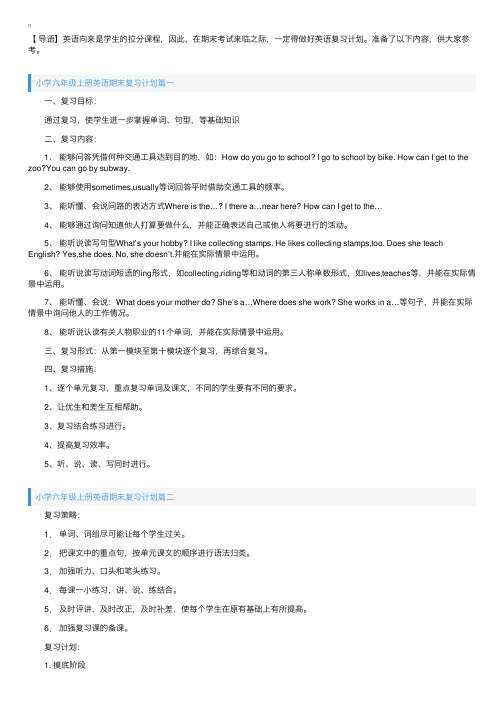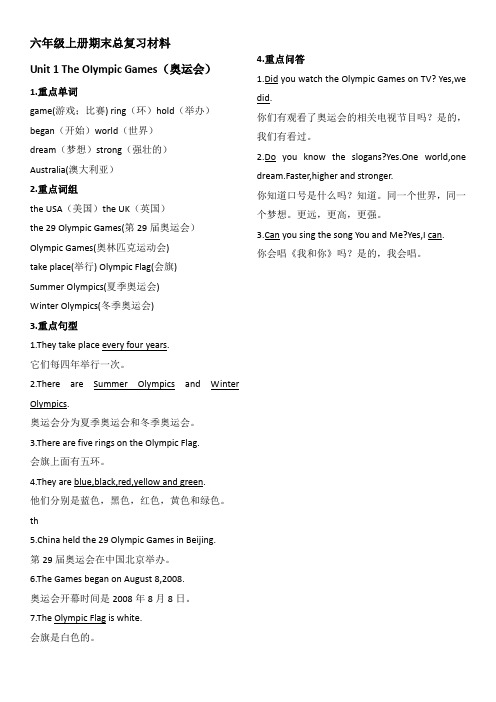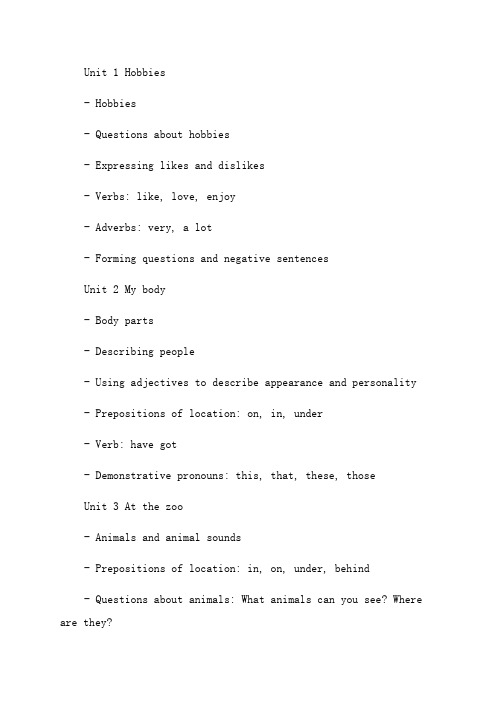小学六年级英语上册期末复习
小学英语六年级上学期期末考试复习卷

小学英语六年级上学期期末考试复习卷一、找出划线部分发音不同的那一项(4分)1.找出划线部分发音不同的那一项()A. greatB. feelC. greenD. feature2.找出划线部分发音不同的那一项()A. knowB. brownC. soundD. count3.找出划线部分发音不同的那一项()A. schoolB. stuckC. MunichD. chase4.找出划线部分发音不同的那一项()A. comicB. comeC. OctoberD. honest二、根据首字母及上下文的提示,填写单词,使句子通顺、合理。
(7分)5.S________ down, please. You drive too fast.6.In America, people on bikes must wear a h________.7.My uncle is a p________. He works on a plane.8.Take a deep b________ and count to ten, then you won't feel so a________.9.— When are you going to the bookstore?— Next w________. I want to buy a d________.三、用所给单词的正确形式填空。
(每小题1分,共4分)10.Look! John ________ (dance) with his friends now.11.The children ________ (have) an art lesson in the park tomorrow.12.My brother ________ (study) English every day. He can ________ (speak) English well.13.Stop ________ (talk)! Let's see a film about a cat and some ________ (mouse).四、根据汉语意思的提示,用英语完成下列句子。
小学六年级上册英语期末复习计划三篇

【导语】英语向来是学⽣的拉分课程,因此,在期末考试来临之际,⼀定得做好英语复习计划。
准备了以下内容,供⼤家参考。
⼩学六年级上册英语期末复习计划篇⼀ ⼀、复习⽬标: 通过复习,使学⽣进⼀步掌握单词、句型,等基础知识 ⼆、复习内容: 1、能够问答凭借何种交通⼯具达到⽬的地,如:How do you go to school? I go to school by bike. How can I get to the zoo?You can go by subway. 2、能够使⽤sometimes,usually等词回答平时借助交通⼯具的频率。
3、能听懂、会说问路的表达⽅式Where is the…? I there a…near here? How can I get to the… 4、能够通过询问知道他⼈打算要做什么,并能正确表达⾃⼰或他⼈将要进⾏的活动。
5、能听说读写句型What’s your hobby? I like collecting stamps. He likes collecting stamps,too. Does she teach English? Yes,she does. No, she doesn’t.并能在实际情景中运⽤。
6、能听说读写动词短语的ing形式,如collecting,riding等和动词的第三⼈称单数形式,如lives,teaches等,并能在实际情景中运⽤。
7、能听懂、会说:What does your mother do? She’s a…Where does she work? She works in a…等句⼦,并能在实际情景中询问他⼈的⼯作情况。
8、能听说认读有关⼈物职业的11个单词,并能在实际情景中运⽤。
三、复习形式:从第⼀模块⾄第⼗模块逐个复习,再综合复习。
四、复习措施: 1、逐个单元复习,重点复习单词及课⽂,不同的学⽣要有不同的要求。
期末复习(讲义)译林版英语六年级上册

六年级上册期末复习一、时态复习1.一般现在时定义:经常发生的动作或现在的状态结构:主语+be/主语+动词注意:第三人称单数be动词用is,动词+s/es否定:主语+be+not 或主语+don't/doesn’t+doShe is=She’s He is=He’s I am=I’m We are=We’reis not=isn't are not=aren't am not不能缩写一般疑问句:①有be动词的情况下将be动词提前②动词用助动词do/does提问注意:改为一般疑问句时,第一人称要改为第二人称时间状语:never、seldom、sometimes、usually、often、always例:①My mother often goes shopping.→改为否定句:My mother often doesn't go shopping.→改为一般疑问句:Does your mother often go shopping?②I get up at 7 o'clock every day.→改为否定句:I don't get up at 7 o'clock every day.→改为一般疑问句:Do you get up at 7 o'clock every day?③Millie is a student.→改为否定句:Millie isn't a student.→改为一般疑问句:is Millie a student?2.现在进行时定义:现在正在做或正在发生的动作结构:is/am/are+doing否定:isn't/aren’t/am not+doing时间状语:Look!Listen!now、There be...over there、where is/are sb.?例:③Look!The girl is dancing.→改为否定句:Look!The girl isn’t dancing.②——Where’s mom, Dad?——Maybe she is cooking dinner in the kitchen.3.一般过去时定义:过去某个时间点发生的动作结构:主语+was/were 或主语+动词过去式否定:主语+was not/were not=主语+wasn't/weren’t 或主语+didn't+do 一般疑问句:①有be动词的情况下将be动词提前②动词用助动词did提问注意:改为一般疑问句时,第一人称要改为第二人称时间状语:yesterday、last...、just now、...ago例:③I was ill yesterday.→改为否定句:I wasn't ill yesterday.→改为一般疑问句:Were you ill yesterday?②He went to zoo with his parents last weekend.→改为否定句:He didn't go to zoo with his parents last weekend.→改为一般疑问句:Did he go to zoo with his parents last weekend?4.一般将来时定义:将来的计划或者打算结构:主语+is/am/are going to be或主语+is/am/are going to do否定:isn’t/aren’t/am not going to一般疑问句:be动词直接提前注意:改为一般疑问句时,第一人称要改为第二人称时间状语:next...、tomorrow例:①It is going to be Chinese New Year next week.→改为否定句:It isn’t going to be Chinese New Year next week.→改为一般疑问句:Is it going to be Chinese New Year next week?②I’m going to visit my grandparents tomorrow.→改为否定句:I’m not going to visit my grandparents tomorrow.→改为一般疑问句:Are you going to visit my grandparents tomorrow?二、易错点复习1.询问天气的两种句型:③what is/was the weather like?③How is/was the weather?2.There be句型③就近原则:be动词由后面的第一个名词决定③there be句型不能与have、has、had连用③there be +sb./sth.(即名词或代词)例:There is rain today.=It is rainy today.3.乘坐公共交通③take the/a bus to...=go to ...by bus=go to... on the bus4.home前面不加任何介词例:walk home drive home take a bus home5.will和shall的区别will表示将要,shall表示建议,shall一般用于疑问句表示提议,主语通常是we。
人教版(PEP)六年级英语上册期末复习知识点

人教版(PEP)六年级英语上册期末复习知识点人教版(PEP)六年级英语上册复习知识点Unit 1 How can I get there?主要单词:science科学museum博物馆post office邮局bookstore书店cinema电影院hospital医院crossing十字路口turn转弯left 向左ask问interesting有趣的Italian意大利restaurant餐馆pizza 比萨饼street大街;街道get到达GPS全球卫星定位系统feature特点follow跟着far较远的tell告诉习惯搭配turn left向左转turn right向右转go straight直行in front of...在...前面next to挨着go straight直走near the park在公园附近on Dongfang Street在东方大街上post office邮局pet hospital 宠物医院Beihai Park北海公园Italian restaurant意大利餐馆Palace Museum故宫博物院science museum科学博物馆主要句子:☆1、☆Where is the museum shop?博物馆的市肆在哪儿?☆☆2、It’s near the door.在大门附近。
☆☆3、How can we get there?我们怎么到那儿?☆☆4、Turn left at the bookstore.在书店左转。
☆5、I want to buy a postcard.我想买一张明片。
6、I’ll ask.我去问问。
7、Wow, a talking robot!哇!一个讲话机器人。
8、What a great museum!好棒的一家博物馆!10、There is a pet hospital in my city.在我的城市有一家宠物医院。
11、Wu Yifan and Robin are looking at some robots.吴一凡和罗宾正在看一些机器人。
闽教版小学英语六年级上册期末总复习材料

六年级上册期末总复习材料Unit 1 The Olympic Games(奥运会)1.重点单词game(游戏;比赛) ring(环)hold(举办)began(开始)world(世界)dream(梦想)strong(强壮的)Australia(澳大利亚)2.重点词组the USA(美国)the UK(英国)the 29 Olympic Games(第29届奥运会)Olympic Games(奥林匹克运动会)take place(举行) Olympic Flag(会旗)Summer Olympics(夏季奥运会)Winter Olympics(冬季奥运会)3.重点句型1.They take place every four years.它们每四年举行一次。
2.There are Summer Olympics and Winter Olympics.奥运会分为夏季奥运会和冬季奥运会。
3.There are five rings on the Olympic Flag.会旗上面有五环。
4.They are blue,black,red,yellow and green.他们分别是蓝色,黑色,红色,黄色和绿色。
th5.China held the 29 Olympic Games in Beijing.第29届奥运会在中国北京举办。
6.The Games began on August 8,2008.奥运会开幕时间是2008年8月8日。
7.The Olympic Flag is white.会旗是白色的。
4.重点问答1.Did you watch the Olympic Games on TV? Yes,we did.你们有观看了奥运会的相关电视节目吗?是的,我们有看过。
2.Do you know the slogans?Yes.One world,one dream.Faster,higher and stronger.你知道口号是什么吗?知道。
六年级英语上册期末复习资料

Unit 1 Hobbies- Hobbies- Questions about hobbies- Expressing likes and dislikes- Verbs: like, love, enjoy- Adverbs: very, a lot- Forming questions and negative sentencesUnit 2 My body- Body parts- Describing people- Using adjectives to describe appearance and personality - Prepositions of location: on, in, under- Verb: have got- Demonstrative pronouns: this, that, these, thoseUnit 3 At the zoo- Animals and animal sounds- Prepositions of location: in, on, under, behind- Questions about animals: What animals can you see? Where are they?- Adjectives: big, small, tall, short, long, thin, fat- Singular and plural nouns- Affirmative and negative sentencesUnit 4 At school- School subjects- Classroom objects- Actions: read, write, draw, play, sing, dance, swim, run - Expressing ability: Can you…? Yes, I can. / No, I can’t.- Expressing permission: Can I…? Yes, you can. / No, you can’t.- Ordinal numbers: first, second, third, etc.Unit 5 My house- Rooms in a house- Furniture and household objects- Prepositions of location: in, on, under, behind, next to, in front of- Questions about rooms and furniture: Is there a…? Are there any…?- There is / There are- Adjectives: big, small, old, new, clean, dirtyUnit 6 At the park- Activities at the park: walk, run, play, ride, climb, swing, slide- Prepositions of location: in, on, under, behind, in front of, next to- Questions about activities: What can you do at the park? Where can you…?- Expressing preferences: I prefer… / I don’t like…Unit 7 In the mountains- Geographical features: mountain, river, lake, valley- Activities in the mountains: hike, climb, swim, fish, take photos- Prepositions of location: in, on, under, behind, in front of, next to- Questions about activities: What can you do in the mountains? Where can you…?- Verb: can- Expressing preferences: I prefer… / I don’t like…Unit 8 In Beijing- Places in Beijing: the Great Wall, the Forbidden City, Tiananmen Square- Activities in Beijing: visit, walk, take photos, climb, buy souvenirs- Prepositions of location: in, on, under, behind, in front of, next to- Questions about places and activities: What can you do in Beijing? Where can you…?- Modal verb: can- Expressing preferences: I prefer… / I don’t like…Unit 9 Food and drinks- Food and drinks- Expressing likes and dislikes about food and drinks- Countable and uncountable nouns- Quantifiers: a glass of, a cup of, a bowl of, some- Adjectives: hot, cold, sweet, salty, sour, delicious, tastyUnit 10 Favourite sports- Sport names- Expressing likes and dislikes about sports- Sports equipment- Questions about sports: What sports do you like? What sports can you play?- Verbs: play, do- Expressing abilities: I can… / I can’t…Unit 11 Time for fun- Months and seasons- Expressing likes and dislikes about activities in different seasons- Ordinal numbers: first, second, third, etc.- Adjectives: sunny, cloudy, rainy, snowy, cold, hot, warm, cool- Present simple tense: I read/write/draw…Unit 12 Holidays- Holidays and holiday activities- Questions about holidays: What holiday is in…? What can you do during…?- Adjectives: long, short, fun, boring, interesting- Expressing future plans: I am going to… I will…- Expressing preferences: I prefer… / I don’t like…总结:这个提纲包含了人教版六年级上册所有的重点内容,可以帮助学生复习整个上学期所学的知识点。
六年级英语上册期末复习资料

六年级英语上册期末复习资料Unit 1: My Family- Vocabulary: family members, descriptions- Grammar: possessive pronouns, plural nounsUnit 2: My School Life- Vocabulary: school subjects, activities- Grammar: present continuous tense, question words- Exercises: write about daily routines, answer questions, identify correct answersUnit 3: My Hobbies- Vocabulary: hobbies, sports, musical instruments- Grammar: simple present tense, adverbs of frequencyUnit 4: My City- Vocabulary: places in the city, transportation- Grammar: prepositions of place, imperative sentences- Exercises: describe a city, fill in the blanks with prepositions, give directionsUnit 5: Celebrations- Vocabulary: holidays, traditionsUnit 6: Food and Drink- Vocabulary: fruits, vegetables, meals- Grammar: countable and uncountable nouns, imperatives- Exercises: describe favorite food, fill in the blanks with countable or uncountable nouns, give instructionsUnit 7: The Animal World- Vocabulary: animals, habitats- Grammar: present simple tense, subject-verb agreementUnit 8: Our Environment- Vocabulary: nature, pollution, recycling- Grammar: modal verbs, future tense- Exercises: write about ways to protect the environment, fill in the blanks with modal verbs, choose correct future tenseUnit 9: Travel Adventures- Vocabulary: transportation, countries, landmarks- Grammar: present perfect tense, question formationUnit 10: Health and Fitness- Vocabulary: body parts, healthy habits, sports以上是六年级英语上册期末复习资料的大纲。
六年级英语上册期末复习资料(人教版六年级上英语全册期末复习提纲)

am 只跟I放在一起be动词 is 主语是单数时用are 主语是复数时用Unit 1 询问一些地点在哪;怎样到达一些地点1.询问地点在哪:Where is the 地点Where is the cinema? 电影院在哪?回答: near(附近)next to(旁边)It’s behind(后面) the 地点in front of(前面)It’s near the zoo. 它在动物园附近。
2. 询问怎样到达一个地点:How can I get to the 地点How can I get there/ here ?How can I get to the cinema? 我怎样到达电影院?回答:turn leftturn right at the 地点 go straightTurn right at the zoo. 动物园右转。
Turn left at the zoo, and then go straight, the cinema is on your left.动物园左转然后直走,电影院在你的左边。
或:You can Take the No.57 bus. 你可以乘坐57路公交车。
人 can take the No.数字 busUnit2 到达一些地点的交通方式doesHow do you go to school? 你怎么去学校?回答:人 go(goes) to school by 交通工具I go to school on foot. She goes to school by bus.2.人 must 动词原形人必须……People on bikes must wear one. 骑自行车的人必须戴一个。
I must pay attention to the traffic lights. 我必须注意交通信号灯。
Unit3 人打算做事1.人 be going to do(动词原形) 人打算(或将要)去做事She is going to see a film. 她打算去看电影。
- 1、下载文档前请自行甄别文档内容的完整性,平台不提供额外的编辑、内容补充、找答案等附加服务。
- 2、"仅部分预览"的文档,不可在线预览部分如存在完整性等问题,可反馈申请退款(可完整预览的文档不适用该条件!)。
- 3、如文档侵犯您的权益,请联系客服反馈,我们会尽快为您处理(人工客服工作时间:9:00-18:30)。
一、选择题。
( ) 1. My mother went , but my father .
A. fishing; wasn’t
B. fish; doesn’t
C. fishing; didn’t
D. fish; didn’t
( ) 2. ---it rainy last night? ---Yes. It heavily.
A. Did; rainy
B. Was; rained
C. Did; rained
D. Was; rainy
( ) 3. ---What do you do _______ Christmas Day? --- We usually _________ a big lunch with our family.
A.on, have B on, are going to have C. in, had D. at, having
) 5. We shouldn’t drive and use plastic bags.
A. too much; too many
B. too many; too much
C. too much; too much
D. too many; too many
( ) 10. What ______ you feel angry? A. make B. makes C. making
( ) 11. We shouldn’t drive or use plastic bags.
A. too much; too many
B. too many; too much
C. too much; too much
D. too many; too many () 12. —— Why swim in the river? —— Can’t you see the sign ‘No swimming’ there?
A. can we
B. should we
C. cann’t we
D. we shouldn’t.
二、用所给词的适当形式填空。
1.Do you know how (protect) the Earth.
2. All the students were about the football game (excite).
3. Water is (use)for us. We use water (wash) clothes.
4.A pair of glasses (be) on the desk yesterday
5. What can we do (keep) our country beautiful?
6.Yang Ling (wait) for the bus now.
7.I would like (be) your friend.
8.Who (make) our streets clean every morning?
9. It is always ___________ (rain) in spring here.
10. We shouldn’t waste too ___________ (many) wood.
三、按要求改写句子。
1.I did my homework last night. (改为一般疑问句)
my homework last night?
2.People should save energy because there’s not much energy(对划线部分提问)
people save energy ?
3.We should not shout in the hospital .(对画线部分提问)
we in the hospital ?
5. Liu Tao visited his uncle last week .(对划线部分提问)
_______ _______ Liu Tao ______ last week ?
6. much, on, there, not, is, Earth, coal (.) (连词成句)
四、根据中文提示完成句子。
1. All students should know (如何保护地球).
2. Most of the energy coal and oil(来自煤炭和石油).
3. I can (再利用塑料瓶子)to make a toy.
4.Drinking too much (对我们的健康有害).
5.Mum, can you __________________________ (讲个有趣的故事) to me?
6. __________________________________ (保持图书馆干净),don’t eat or drink here.
7.To protect the Earth, we shouldn’t ___________________________ (频繁开车).。
